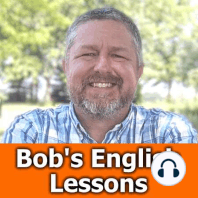4 min listen

Learn the English Phrases NOWHERE TO BE FOUND and IN PLAIN SIGHT
Learn the English Phrases NOWHERE TO BE FOUND and IN PLAIN SIGHT
ratings:
Length:
4 minutes
Released:
Nov 19, 2020
Format:
Podcast episode
Description
Read long to learn the English Phrases NOWHERE TO BE FOUND and IN PLAIN SIGHTIn this English lesson I wanted to help you learn the English phrase, nowhere to be found. When something is nowhere to be found, it means you can't find it. I'm not sure why we don't just say that we can't find it, but we often will say that it's nowhere to be found. Sometimes when I'm leaving for work, I can't find my keys. I look in every room in the house and I say to Jen, "Jen, my keys are nowhere to be found. Have you seen them?" So it's simply a way of describing something that you can't find. I also use this phrase quite a bit when I'm looking for the remote control when I want to watch TV. I'll say to my kids, "Guys, the remote control is nowhere to be found, who used it last and where did you put it?" So when you say that something is nowhere to be found, it means that you can't find it. And you could use this with a person as well. Like if someone disappeared, you could say that they are nowhere to be foundWANT MORE ENGLISH LESSONS? GO TO YOUTUBE AND SEARCH, "BOB THE CANADIAN"#englishlesson #englishvocabulary #speakingenglish #bobthecanadian The other phrase I wanted to teach you today is the phrase in plain sight. Sometimes when my keys are nowhere to be found, when I do eventually find them, they're usually somewhere in plain sight. They're usually just laying on my desk, beside my computer or just laying on the kitchen table. When something is in plain sight, it means that it's not hidden, it's not hard to find, it's right there where you are looking. So often when I lose my keys, which does happen once in a while by the way, when I do find them, they are just laying somewhere in plain sight. Usually the kitchen table, sometimes by my desk. It's rare that I actually lose my keys permanently. Although that did happen once in my life. And I had to get new keys for everything. That was not enjoyable. Anyways, to review, when you say that something is nowhere to be found, it simply means that it's lost. And when you say that something is in plain sight, it means that it's laying somewhere and it's completely obvious, if you walk by, you would just see it.Hey, let's look at a comment from a previous video. This comment is from Renald. And Renald says, "I'm 59 years old and I think it's never too late to learn new languages. And it's very good to keep my brain healthy." My response was this, "That's a great point, Renald. For sure, learning a language helps keep the mind sharp. I plan to learn another language someday, other than French and English for that very reason." So thanks Renald for that comment. And that was from the lesson yesterday or two days ago where I talked about saying it's never too late to start learning English, or it's never too late to start something new. So Renald makes a good point though. When you learn a language, especially later in life, it's really good for your brain. It helps keep your brain sharp. If you only do the things that you always do and you never try something new, that's not good for your brain. It's really good for your brain to do new things all the time.So what's my plan? As Renald said, he's 59 years old, I think when I'm that old in about 10 or 11 years, I'm not gonna tell you exactly, I would love to start learning a third language, maybe even a fourth language, but I don't want to get too far ahead of myself. I certainly think that when I'm that age, I hope that I will be working a little bit less and I hope that I will have some time to do something like learn a new language. What language? I'm not sure. Support the show (https://www.patreon.com/bobthecanadian)
Released:
Nov 19, 2020
Format:
Podcast episode
Titles in the series (100)
Learn the English Sayings TOO MANY COOKS SPOIL THE BROTH and MANY HANDS MAKE LIGHT WORK by Bob's Short English Lessons